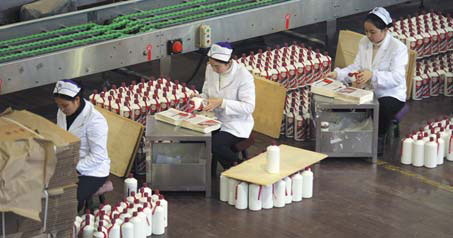Family ties: A livelihood for generations
Standing at the mouth of the Luoshuidong cave in the outer reaches of Moutai town, 47-year-old Chen Lin lights up a cigarette as he talks about working as a second-generation farmer for the country's top liquor maker.
He said the local economy is dependent to a large extent on Kweichow Moutai, which employs about 70,000 farmers in the province in addition to more than 20,000 workers in its production facilities.
The famed distiller generated 40 billion yuan ($6.4 billion) in revenues in 2013.
Most of the farmers grow sorghum, while others produce grains and crops such as wheat and potatoes, a part of the company's organic farming venture that began in 2000 and now covers more than 45,000 hectares of land.
"Farmers generally make more than 10,000 yuan a year at present. It used to be 1,000," Chen said.
Chen has two children, one of which in college.
He grew wheat and corn before taking up full-time sorghum farming. Wheat is also a key element for Moutai liquor, mixed with sorghum during fermentation. Small land holdings and farm cooperatives appear to be the business model in the surrounding countryside.
Yet Chen sees another source of revenue. He stands on a hilly area covered in mist through the winter. Less than 20 minutes by road from Moutai town, the scenic spot can attract more money and jobs through tourism, Chen said.
Local government officials said the province is spending some 23.5 million yuan on 64 road and infrastructure projects to provide better access.
Women power
In the county of Tanchang, not far from Maotai, lush terraced farms of sorghum offer an alluring view. Tong Fu is sitting outside a small grocery shop that he and his wife, Chen Derong, run. Tong too comes from a family of farmers.
Of his three children, his son graduated in food sciences and now works for Moutai, while his two daughters study in college.
As the demand for Moutai liquor rose in the past few years, Tong, 55, moved to planting sorghum instead of other crops. "Sorghum needs fewer people (to tend)," he said, adding that in case of crop failure, they are still compensated.
Chen Derong, 45, said her husband spends most of the day in the field where red sorghum seeds are sown in April and the harvest is ready by September or October. During off seasons, he helps her with their shop, she said.
There are some 158 villages surrounding Renhuai where sorghum for Moutai is cultivated. More than 133,000 hectares of farmland in the province is used to support the baijiu - or white spirits - industry. Home to dozens of other liquor brands, Guizhou also serves as a hub for liquor traders across China.
The quaint baijiu street in Maotai town, with rows of neatly arranged shops on either side, is where liquor traders gather.
In 1951, a number of private distilleries in Guizhou merged to form the State-run Moutai factory.
Chen Derong, who wakes up at 6 every morning to feed her family's pigs, said more women than men work on the farms near where she lives.
"I wouldn't call that a contribution," she said shying away from any suggestion that female farm workers have contributed significantly to the brand's popularity.
At a packaging factory for Moutai away from the green fields, women in white uniforms intently observe the red-on-white bottles that pass through four assembly lines. Of the unit's 1,020 workers, 250 are male. The rest are female.
2,000 years
In 1915, Moutai, then privately owned, won global recognition at a world trade fair in southern California. In his book, company chairman Yuan Renguo attributed the success to the "superior aroma" of the drink.
In this corner of China, generations of people have been associated with making baijiu for 2,000 years, according to historical accounts.
Today Moutai's daily output is about 200,000 bottles and more than 300 varieties produced by 12 assembly lines.
Wang Zhihang, 25, who studied business management in college and has been working at the packaging factory for the past few years, said "more and more young graduates are joining the company".
Moutai has many in-house couples as well.
Cheng Shiwei, who works at Moutai's branding strategy department, said that of the town's 57,000 people, a good portion works or has worked for the company. After finishing college, the 28-year-old interned at Chinese multinational Huawei, but he always felt drawn back to Moutai because of family ties.
His late grandfather and father had both worked at the factory.
satarupa@chinadaily.com.cn
|
Female workers are an important part of the workforce that contributes to Moutai's continued development. In the packaging factory, 770 of the 1,020 workers are women. Wang Zhuangfei / China Daily |
(China Daily 03/09/2015 page7)















